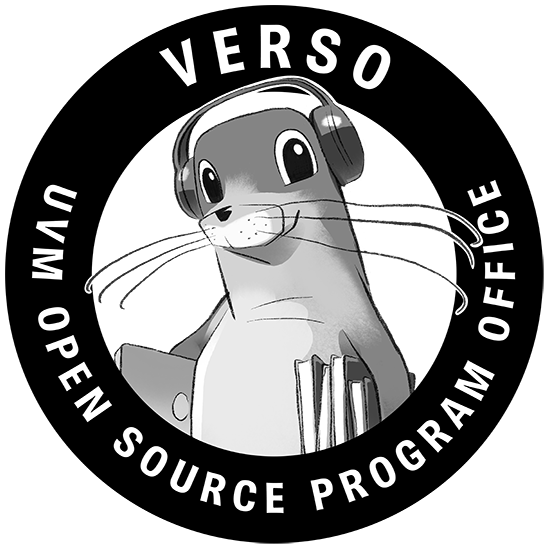What Kind of Projects
We believe in Open Work, projects from the staff, faculty and larger community are welcome if those projects relate to open themes. This could include that the final product is published under an open source license, or it could mean that the methods/processes but not the data is shared externally. Take a look at the current projects under the Projects tab to get an idea of what is out there.
Important Dates and Deadlines
We are accepting proposals on a rolling basis, this means submit it when you are ready. Applications will be reviewed once a month and reviewed by the committee on the first Monday of each month. Each Academic year VERSO selected a limited number of projects to sponsor.
What You Need To Know
The University of Vermont VERSO team is excited to announce the launch of the VERSO Open Source Project Program! The VERSO program aims to support and grow open-source projects and communities. We encourage applications from researchers at all levels to apply.
Awardees will be welcomed into the VERSO community and encouraged to collaborate amongst one another via a shared Slack workspace, quarterly virtual brainstorming meetings, and a shared Gitlab repo. At this time there is no financial award.
Award Contact: Kendall Fortney Program Director (kendall.fortney@uvm.edu)
Applications will be reviewed by a selection panel of VERSO core team members, external faculty, and open-source experts. Applications will be reviewed once a month and reviewed by the committee on the first Monday of each month.
Current review Panel: Laurent Hebert-Dufresne, John Meluso, Juniper Lovato, Kendall Fortney
Required materials for an VERSO Open Source Award proposal include the following items:
- Completion of our online application form (below)
- Current C.V. for all applicants (email to: kendall.fortney@uvm.edu)
Who is eligible to apply
Any staff, faculty and Vermont community member currently working on questions related to open-source and open work!
Women and historically underrepresented minorities in STEM are particularly encouraged to apply.
Submit a Proposal
Awardee Expectations:
- All awards involving human subjects must be granted IRB approval from their home institution.
- All intellectual property created by the University is owned by the University. All intellectual property created solely by a non-University related awardee as a result of this award is owned by the awardee. University-related awardees are subject to the University’s Intellectual Property Policy. see https://www.uvm.edu/sites/default/files/UVM-Policies/policies/intellectualproperty.pdf.
- You will need to acknowledge VERSO as a contributor of any publications, presentations, poster, or reports from the proposed work using the following language:
- “This work was supported by the Vermont Research Open Source Program Office (VERSO) from the Vermont Complex Systems Center at the University of Vermont. Any opinions, findings, and conclusions or recommendations expressed in this material are those of the author(s) and do not necessarily reflect the views of the University of Vermont.”
- Except as otherwise set forth in this Agreement, the University’s name and log can only be used with its prior written permission. See https://www.uvm.edu/sites/default/files/UVM-Policies/policies/letterhead.pdf.
- Please let us know in advance about any resulting papers, reports, or other publications as well as media requests.
- For UVM awardees, if the work funded under this VERSO Projects is likely to produce any inventions or patent applications, awardees will coordinate with UVM Innovations at innovate@uvm.edu.
Current/Past Projects

Controlled Digital Lending
Controlled Digital Lending (CDL) is an emerging method that allows libraries to loan print books to digital patrons in a “lend like print” fashion. Through CDL, libraries use technical controls to ensure a consistent “owned-to-loaned” ratio, meaning the library circulates the exact number of copies of a specific title it owns, regardless of format, putting controls in place to prevent users from redistributing or copying the digitized version.
